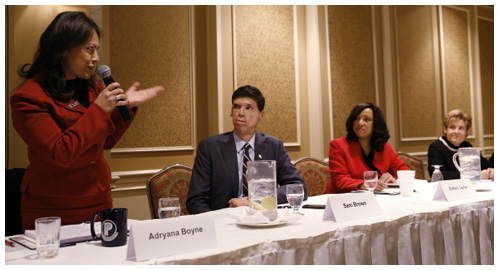 In Texas political races all over the state, candidates are being grilled about what they think of sweeping education reforms passed by the legislature last year. While there is pretty much universal agreement that the big reductions in standardized testing were a positive step, there is controversy about changes to graduation requirements that create multiple paths to a high school diploma. The idea, essentially, is that not all kids will go to college so the state will now promote both college readiness as well as career readiness.
In Texas political races all over the state, candidates are being grilled about what they think of sweeping education reforms passed by the legislature last year. While there is pretty much universal agreement that the big reductions in standardized testing were a positive step, there is controversy about changes to graduation requirements that create multiple paths to a high school diploma. The idea, essentially, is that not all kids will go to college so the state will now promote both college readiness as well as career readiness.
The business community is not monolithic, so there are some such as the Greater Austin Chamber of Commerce and the Texas Association of Business as well as some minority rights groups which want to roll back those reforms. Others, like our friends in the construction industry who are interested in promoting the skilled trades, want to give the reforms the time needed to truly take hold. This is an honest debate and anyone who's followed my work knows what I think about it.
Last Thursday, I moderated a Texas House candidates forum hosted by the Richardson and North Dallas Chambers of Commerce, where the subject was a hot one with both the candidates and the people in the crowd.
Representatives from the Richardson Independent School District, for example, are thrilled to see what the legislature did and want to support those reforms moving forward. The board has taken the view that there are too many kids being underserved now by a one-size-fits-all policy that has, as many have said, only gotten worse in Texas over the past two decades.
On the other side, the Richardson Chamber of Commerce has opposed what the group views as a weakening of standards. Many of their members are companies in the technology sector, so it makes some sense that they would have a different view. Their belief is that to have a workforce that's ready for the jobs of the future, as many students as possible need to be well-versed in science, technology, engineering, and mathematics, often referred to as STEM curricula.
As far as the candidates themselves running for Texas House District 102 –which takes in parts of North Dallas, Richardson, and Garland – Latina activist Adryana Boyne said “it’s important that we have the trades and recognize that not all children are the same.” She added that “Maybe college is not for them. The important thing is for them to be prepared to go and get a job.”
Retired Army Captain Sam Brown, a wounded veteran who is one of five people running for that seat, said the school reforms shouldn't be touched by lawmakers when they reconvene in their 2015 session. “You can’t really force a kid into anything in particular,” Brown said. “If someone wants to pursue a vocational job, they should be allowed to do that.”
Late last year, a landmark event was held in Houston on this subject where business leaders and educators who support the reforms came together. I asked the chair of the event, Mike Holland at Marek Brothers Systems, what he would say to those who think the state is moving backward by enacting these reforms. He said,
“Texas is missing the boat on both ends of the spectrum. Certainly higher levels of academic achievement, particularly in math and science, should be promoted, and we need to improve in this area. Many students however, are looking for different skill sets and careers not requiring four-year college degrees, and are opting out of even completing high school – often becoming a burden on society instead of becoming productive workers with rewarding careers.”
We will continue to track this issue as it continues to be debated in Texas and across the country.
Education Reforms Emerge As a Point of Contention in Texas Political Contests
by Scott Braddock | January 28, 2014



Add new comment